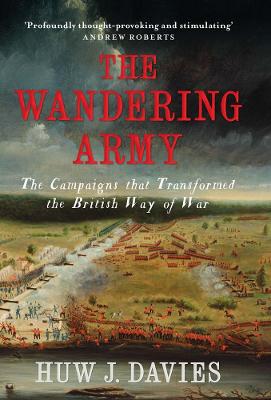
The Wandering Army
Huw J. Davies
£25.00
Description
A compelling history of the British Army in the eighteenth and nineteenth centuries-showing how the military gathered knowledge from campaigns across the globe
“Superb analysis.”-William Anthony Hay, Wall Street Journal
At the outbreak of the War of Austrian Succession in 1742, the British Army’s military tactics were tired and outdated, stultified after three decades of peace. The army’s leadership was conservative, resistant to change, and unable to match new military techniques developing on the continent. Losses were cataclysmic and the force was in dire need of modernization-both in terms of strategy and in leadership and technology.
In this wide-ranging and highly original account, Huw J. Davies traces the British Army’s accumulation of military knowledge across the following century. An essentially global force, British armies and soldiers continually gleaned and synthesized strategy from war zones the world over: from Europe to the Americas, Africa, and Asia. Davies records how the army and its officers put this globally acquired knowledge to use, exchanging information and developing into a remarkable vehicle of innovation-leading to the pinnacle of its military prowess in the nineteenth century.
Publisher Review
"The British Way of War ... is a rich and thought-provoking book that will be of great interest in relation to the momentous first decades of the twentieth century, to British strategy, and about strategy more generally" - Evan Mawdsley, International Journal of Military History and Historiography "In this wide ranging and important study, Huw Davies assesses an improvement in military proficiency that was highly significant for global as well as British history. It deserves considerable attention."-Jeremy Black, author of Military Strategy "An eminently readable book, offering an important new perspective on Britain's military leadership and warfare strategies in a period of significant change. Davies gives us a rare front-row seat at mess tables, desks, and command tents of eighteenth-century army personnel around the globe."-Jennine Hurl-Eamon, author of Marriage and the British Army in the Long Eighteenth Century "This well-researched, well-written and profoundly thought-provoking and stimulating book will force us to reappraise the whole area of the British Army's evolution from the eve of the Seven Years War to that of the Crimean War."-Andrew Roberts, author of Napoleon: A Life "An important exploration of how formal and informal networks shaped knowledge exchange and institutional learning during the British military enlightenment of the mid-18th century. Davies has brought together an impressive expanse of archival research in order to show how the British army learned and adapted in its first series of global imperial wars."-Dr Anna Brinkman-Schwartz, King's College London "In this wide ranging and important study, Huw Davies assesses an improvement in military proficiency that was highly significant for global as well as British history. It deserves considerable attention."-Jeremy Black, author of Military Strategy -- Jeremy Black "An eminently readable book, offering an important new perspective on Britain's military leadership and warfare strategies in a period of significant change. Davies gives us a rare front-row seat at mess tables, desks, and command tents of eighteenth-century army personnel around the globe."-Jennine Hurl-Eamon, author of Marriage and the British Army in the Long Eighteenth Century -- Jennine Hurl-Eamon "This well-researched, well-written and profoundly thought-provoking and stimulating book will force us to reappraise the whole area of the British Army's evolution from the eve of the Seven Years War to that of the Crimean War."-Andrew Roberts, author of Napoleon: A Life -- Andrew Roberts "An important exploration of how formal and informal networks shaped knowledge exchange and institutional learning during the British military enlightenment of the mid-18th century. Davies has brought together an impressive expanse of archival research in order to show how the British army learned and adapted in its first series of global imperial wars."-Dr Anna Brinkman-Schwartz, King's College London -- Anna Brinkman-Schwartz
Book experts at your service
What are you looking for?